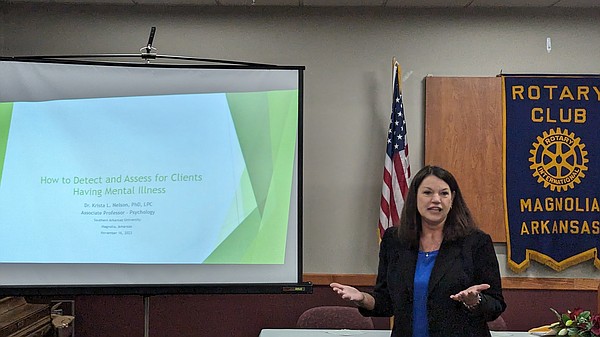
Dr. Krista Nelson the Associate Professor of Psychology at Southern Arkansas University (SAU), counseling psychologist and licensed professional counselor spoke to the Magnolia Rotary Club on Nov. 16.
Nelson’s area of research focuses on fear of failure, self-efficacy, gender roles, terrorism, self-esteem, body esteem and the impostor phenomenon.
She received her Bachelor’s in Psychology in 1993 from Pittsburg State University, Master’s in Education in agency Counseling from SAU in 2001 and PhD in Counseling Psychology from Louisiana Tech University in 2012.
“I had gotten some grants and SAU was kind enough to let me go and collect data. I had started getting interested in terroristic beliefs and noticed there isn’t a scale to measure how people think about terrorism and what they think about terrorism,” said Nelson.
She used the data to help create a scale of how people feel about different kinds of terrorism including religious and political terrorism.
“We have such a dearth of mental health professionals. We see it on the college campus. We see it in everyday life that folks are struggling. We really need to all be working together to make sure that everyone is being able to be seen or receive therapy,” she said.
Nelson said that SAU has a quality Master’s in counseling degree where most students graduate and pass their licensing exams.
“Our pass rate for the NCE, which is the National Counselor Examination is amazing because our professors are great,” she said.
The World Health Organization has recommended that hospitals and emergency rooms train in mental health and examine the mental health of patients during intake to discover issues with anxiety and depression said Nelson.
She said, “Most everyone has had a common cold at some point in your life. Well, the same with depression. You may not have been diagnosed, but you may have experienced something traumatic. Sometimes we don’t even realize there’s some situations that we can benefit from therapy.”
Nelson said that she had to get therapy following a house fire in 2005 because the event affected her mood and how she interacted with other people.
“When we talk about psychological disorders it is a pattern of behavioral cognitive emotional, and or physical symptoms, shown by an individual. It varies from person to person,” she said.
Symptoms of depression can be classic or can affect energy levels, hunger and sleeping patterns. Nelson said because of the variation in symptoms it is important to look at all the symptoms someone has when considering a diagnosis.
Although medication may be needed for chronic mental health issues it is important for everyone to have mental healthcare even if they do not need medication she said.
Nelson said it is also important to destigmatize mental healthcare.
“It’s okay to go talk to someone when you’re struggling,” she said.
The Diagnostic and Statistical Manual of Mental Disorders (DSM) helps to standardize the mental health field and keep diagnostic criteria the same despite region and culture said Nelson.
“What’s normal here is not necessarily normal somewhere else, and vice versa. When we think about some of the cultural norms related to mental health, sometimes things that we think is a little abnormal for our family, may not be abnormal for another family or another individual. We have to take that into account,” she said.
She said that counselors look for deviance, dysfunctionality, distress and danger when diagnosing a patient.
Deviance is any behavior that is not normal, dysfunctionality is when behaviors make a patient’s life more difficult, distress is behavior caused by emotional turmoil and most importantly when a patient is a danger to themselves or others the counselor needs to take action to prevent the dangerous ideations and actions said Nelson.
One demographic that is increasingly becoming a danger to themselves is the growing elderly population she said.
“We’re living longer, but sometimes those few last remaining years aren’t always healthy years. We’re having individuals of senior adult age who are feeling suicidal. They may be have a diagnosis of maybe cancer and they don’t want to be a burden to their family. They just decide to kill themselves and it’s tragic. Females attempt suicide twice as many times as males. However, males are more successful when they attempt. It’s usually lethal because (men) attempt,” said Nelson.
The suicide hotline number is 988.
